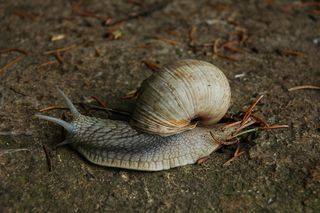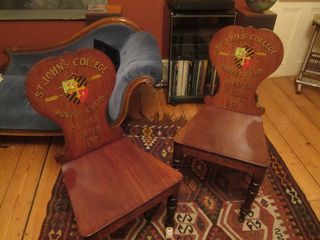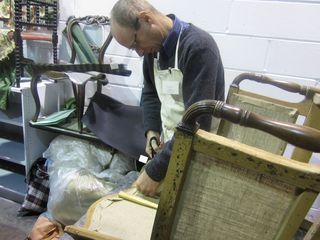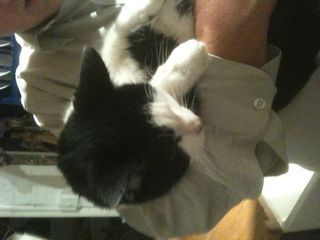Mary Beard's Blog, page 51
October 17, 2012
Did Roman girls giggle?
I have been spending every spare moment that I have (and there aren't many, I promise you) trying to get the first draft of my Roman laughter book finished. I have done the most difficult bit -- that is writing about the theory and method of studying Roman laughter. When I did the lectures on which the book is based, I didnt do very much on that kind of stuff, or rather I dropped it in from time to time, rather than treating it in any systematic way. There is nothing worse than going to a series of lectures and finding that in Lecture One the lecturer draws his or her breath and tell you all about the methodological underpinnings and problems of what they are about to do... but you, the listener, dont yet know what that is.
That's fine for lectures, but not I think for the-book-of-the-lectures. Laughter is a particularly tricky area in history. It's history's final frontier in a way...raising in the acutest form I can imagine all those basic issues of historical knowledge, the familiarity/difference of people in the past etc. So you can't just shelve all that -- and, even if you're writing about the Romans, you can't simply duck all those questions about what Aristotle did or didn't mean when he wrote about laughter (I mean some Romans read a lot of Aristotle and whatever he had to say was part of Roman culture, as well as Greek). And that takes you into another vast bibliography . . .
But the rhetorical problems in the book still have something in common with the rhetorical problems of the lectures. Does the reader really want to sit down and slog through a load of theoretical prolegomena before they actually meet a Roman laughing? Of course they don't. So I've spent a long time trying to integrate some important (well, I think it's important) theory and method into some good and compelling Roman examples. In fact I start from a wonderful story where the historian Dio is sitting in the Colosseum and the emperor Commodus (who is playing at being a gladiator and beast hunter) comes over and waves the head of a decapitated ostrich at the senators, as if to say "you next". Dio explains that he can hardly stop himself laughing, but knows that would be dangerous... so he plucks a leaf from the wreath on his head and chews on it.
It's one of one of the few occasions where we can imagine an almost physical link between us and an ancient laugher . . . but it turns out to be (as I spend quite a long time showing) a much more complicated story than it looks at first sight.
Anyway, I'm through all that bit. And I'm on to the part of the book that is in some ways easier: that is, the "case study" chapters that follow rather more closely the topics of the lectures. I'm on to the one now which focussed on the way laughter marks the boundary between men and animals but it kick off with female laughter (yes, not a particularly feminist link there).
And here is my problem and some blog readers might be able to help. I want to argue that the idea of female giggling is not particularly marked in the ancient world -- the kind of giggling you find in Chaucer's the Miller's Tale with Alisoun's laughter at her cuckolded husband (the subject of a great essay by Angela Carter who wrote about the sound of innocent glee with which women humiliate men).
Now, I dont think you find that in ancient literature, or only very rarely. You find laughing women, of course, and plenty of laughing prostitutes, and women laughing at men -- but the specific kind of gendered laughter that the giggle represents you hardly come across. I've found a bit of Theocritus where the nymphs seem to giggle at the unfortunate giant Polyphemus. But am I being really dumb and missing a load of other examples?
I'm not imagining that the absence of giggles from Roman literature necessarily means that Roman women didnt giggle. As a counter-cultural female form (as much as a way of writing off female laughter), it might not have been incorporated into mainstream male literature (as Carter points out, after Alisoun's giggle, you hardly find giggles in western literature for 500 years or so).
All the same, in trying to map what is distinctive about the Roman representation of laughter, the absence of giggling is something I'd like to point to. But am I right? Looking for an absence is always hard.
October 11, 2012
Jimmy Savile and Juvenal
I mentioned in my last post that we had read a bit of Juvenal Satires 10 (Johnson's "The Vanity of Human Wishes") in our Cheltenham Festival gig. The whole idea of the Satire is to question what really matters in the world, and to ask how far standard human aspirations (power, wealth etc) are worth aspiring to. It now turns out that it was all a bit more relevant to our own times than we might have thought.
The section we concentrated on was about the very nasty henchman of the emperor Tiberius, Sejanus . . . it's here in Latin from line 56, and here in English.
Juvenal's "joke" is about the fall of Sejanus and the way his statue was pulled down when he was overturned -- a nice bronze work of art, destroyed by the revolutionary people, melted down and turned into frying pans and piss pots. As Llew said, Juvenal is great here, in mixing up the high and low language: the great epic statue and its language is turned into the language and vessels of the street (Sejanus becomes a matella or a sartago... a pot and a frying pan).
But, as Llew also pointed out, Juvenal is being more complicated. Because, as Juvenal says in the poem, Sejanus whose statue was being gleefully pulled down, had been worshipped by the very people who were now destroying him (adoratum populo). So, in a way, Juvenal's joke is on us.. because "we" (that is the Roman people) were those who elevated the guy, with our misplaced adoration, in the first place.
And that is where it gets us with Savile. We are guilty of exactly what Juvenal points at: the very people who stupidly elevated him are now dragging him down.
Or more generously, I guess (and this is what underlies Juvenal's complaints), we are only able to see the guy as either black or white. We are now pulling down his statue. But isn't the problem about Savile that he seems (if we believe the reports) to have been both a horrible male abuser of power, and he also did all kinds of charity good. Yet we dont have a way of saying both bad and good. All we can do is lionize or excoriate.
To put it another way, what we are doing is some version of a Roman damnatio memoriae (expunging the record). That's removing the tombstone etc. Very Roman indeed,
Dont get me wrong, I am pretty revolted by Savile, but we are all complicit in this "repositioning". Shouldnt we look at why we wanted to make him a national treasure in the first place?
October 9, 2012
Classics at Cheltenham -- and Chedworth Roman Villa
Last weekend, I hoofed it to Cheltenham Literary Festival. The prime objective was to be junior partner, with Peter Stothard and Llew Morgan, in the third of our "How to read a Latin poem" gigs at the festival... and by Latin, I mean Latin, in Latin.
This year we did an epigram of Martial and a couple of passages of Juvenal (from Satires 3 and 10). And, let's brag a bit, we had a full house of 330 people, actually enjoying the real Latin -- and they were of all ages from 15- to 75+. Quite a lot of people said they were coming back to Latin after 30 years or so.
That was in the morning. In the evening, I had a fun discussion with Natalie Haynes about classics, blogging and All in a Don's Day; then a discussion about "What is a University For?" Why, oh why, do politicians who should know better -- Lord Adonis in this case -- always kick off with a bit of Oxbridge bashing, as if there were only two universities in this country, and then move on to brag about their own achievements (in Adonis's case it was the "Teach First"scheme, which I much admired until it was sound bited into the discussion with minimal relevance at every possible opportunity, then tweeted... counter suggestible, moi?)
But between Juvenal and talking to Natalie, Llewelyn and I zoomed out with one of the generous National Trust  curators to have a fresh look at Chedworth Roman Villa. I had been there moons ago (I think the last time was c. 1973) and sort of remembered the Victorian museum in the centre of the site and the supposed water shrine just outside the main building area. But it had recently been done up, and (unusually with these things) done up for the better.
curators to have a fresh look at Chedworth Roman Villa. I had been there moons ago (I think the last time was c. 1973) and sort of remembered the Victorian museum in the centre of the site and the supposed water shrine just outside the main building area. But it had recently been done up, and (unusually with these things) done up for the better.

One of the best bits was the new range of display buildings constructed over the main mosaics on the site. These included great viewing areas of the pavements and bath installations -- integrated with a  working area for kids (including, as you can see, some Romano-British dressing up clothes).
working area for kids (including, as you can see, some Romano-British dressing up clothes).
These big Roman villas in Britain are really very odd.. and always odder than you remember. Chedworth is vast, and whoever owned it must have been loaded. And it's such a weird mixture. Some bits of it seem very upmarket (these are the best level mosaics that you can get in this not very posh province), and other bits of art and decoration seem plonking in the extreme (I know this is a dead unfashionable view, but there are some little sculptures which really are "bad", and by that I dont mean "not classical in style" -- I mean "bad").
What's also puzzling is what the villa was for. It is so big, and it has such an extensive bathing suite that some people have suspected that it was more than a big private house. Perhaps some kind of hostel associated that holy spring. But others have been suspicious of that religious rabbit out of the hat, and  insist that it was just a very big country house.
insist that it was just a very big country house.
Actually Llew and I got a bit entranced by the natural history of the place, especially the snails (above). The standard line goes that the descendants of the (eating) snails introduced by the Romans were still alive and kicking in the immediate area. How cool an example of continuity is that?
Well worth going.
October 5, 2012
How have students changed (1984-2012)? And what is a university for?
Yesterday evening I had a party for all the 20 or so Classics students at Newnham, undergraduates and grads (and a few fellows). We had some nice glasses of prosecco and orange juice, and a good chat... and I came home after a couple of hours to think about how the class of 2012 was different from the class of 1984. (Don't worry ladies, I'm not going to embarrass you..!)
It's easy to dump on the students of 2012 versus those of "our" generation (whenever than might be). And it's true that there are differences and downsides. Many of them, for example, have had a lot less time than we had to work out about how you learn on your own. People my age remember having loads of free periods to work in the library when we were 16 or so. Whether that's better than doing PSE, and whether we really did use the time to read rather than have a quick fag behind the bike shed, I am not sure -- but there was the beginning of a sense of independent learning and time management in our apparently free time, and it was a good prepraration for uni.
But it wasn't that which struck me as we caroused (modestly) last night. I came home thinking how much had changed in 25 years (despite what you hear about how Oxbridge is stuck in the past). For a start, we now have in college a much more mixed undergraduate and graduate community. At the party we had 4 grads there -- doing Masters courses and PhD's. 30 years ago, when I did my PhD, we grads were pretty much invisible, perhaps one every other year. The community was really an undergrad affair.
Then they were more international, and that was not only the grads -- though they were particularly so. We have a new first year undergraduate from Puerto Rico (doing the four year course), not to mention a Chinese and Scandavian grad (and a Brazilian who couldn't make it), and we have British students with an ethnic background in India and the Far East. We also have mature students and " kids" (sorry kids) who have never done classical languages before, but are learning them in Cambridge from scratch (hard work but worth it), and other doing Latin and French.
And if you were to ask about school types, then there are students from maintained and independent schools -- and quite rightly, they are prepared to discuss exactly the issues we would expect them to, in and around the politics of that.
I have to say I feel proud and privileged to have something to do with these students over the next few years. And if if you asked what I hoped to do with them, I would say (for a start) that I would want them to learn to think harder about things they had never thought hard about before (and that wouldn't be a bad start).
(And, as for the rest on what universities are for (at the risk of self advertising), come along to our debate on exactly that at Cheltenham Lit Festival on Sunday.)
October 1, 2012
Are these chairs fakes?
As a woman who is rather down on rowimg (it tends to keep good students on the river and away from their books...), I am surprised that I have just bought two bits of Cambridge rowing memorabilia (or are they?)/
At our favourite local auction house last weekend, we had spotted two rather pretty mahogany chairs, each one painted with the logo of "St John's College Rowing Club", plus the name of the cox, dates 1896 and 1897, and on one the triumphant phrase "bumped Kings".
We reckoned they would go for a bit more money than we had, so didn't put in a bid. But on Sunday night we discovered they had not been sold, so bought them for the reserve price. (OK £400 was still more than we had, but it was the husband's birthday (which we had hardly celebrated ) and I had just got a little royalty cheque -- so why not, eh?)
They are now installed in the front room, and very handsome they are.
But the two (three counting the son) historians in this house are puzzled, if not downright
suspicious, about the historicity of this pair. Why?

For a start "St John's Rowing Club" is not a really bona fide Cambridge term; the St John's College boat club is called the "Lady Margaret Boat Club" and so far as I can tell has been since 1825. So maybe they are actually Oxford chairs. Well, that would fit with the reference to "torpids" (what Cambridge people would call Lent bumps), but one of the chairs says "bumped Kings" on it. And there is not Oxford college of that name.
But if we assume they are Cambridge, there is still a problem. My learned friend from St Johns (Peter  Linehan) assures me that St Johns did not bump King's in either of those years (though King's, Linehan assures me, did bump the Lady Margaret second boat). And neither he nor I can find any trace in any Cambridge work of reference of the two coxes names on the chairs (Walker and Harvey).
Linehan) assures me that St Johns did not bump King's in either of those years (though King's, Linehan assures me, did bump the Lady Margaret second boat). And neither he nor I can find any trace in any Cambridge work of reference of the two coxes names on the chairs (Walker and Harvey).
So in some sense they must be a fake. But in what sense. There seems to us no doubt that these are old mahogany chairs, and at £200 a piece, they are certainly not fakers' paradise. And in any case, what FOR?
 One little lead is a pair of look-a-likes commemorating Henley Rowing Club in a similar time frame. So maybe some firm was churning them out for wannabee rowers. But if so, why aren't there more?
One little lead is a pair of look-a-likes commemorating Henley Rowing Club in a similar time frame. So maybe some firm was churning them out for wannabee rowers. But if so, why aren't there more?
The only other lead we have is that our pair seems to have been sold in Cowes in August this year for £500 (presumably they were resold near Cambridge by someone hoping (wrongly) for a local profit).
Any help, or ideas, much appreciated. And we like them whatever they are.
September 28, 2012
Sat nav rage -- and chaises longues in the Fens
I've begun to accept that I am rather missing the old road atlas.
I mean sat navs are great when you are on your own, trying to get to a destination you don't know in some busy central city. How many times have I been on my way to talk at a school, got in the wrong lane and found myself back on the ringroad that I came in on... and ended up 30 minutes late, while the assembled junior classicists got more and more restless, and the teachers more anxious, wondering when I would turn up? (This was the era before mobile phones too.)
But honestly, if you've got a passenger, and if s/he is a reasonably competent atlas reader, then s/he's a much better bet than the electronic voice. "You're going to be turning right in a bit, so I'd get in the right hand lane" is a lot more engaging than the damn woman who intones in her cyborg tones "prepare to turn right".
In fact, I've ended up pretty aggressive against the disembodied voice in my car (even if I do still use it.. partly because -- of course -- we've thrown our atlases away).

Currently, we have an integral, built-in sat nav. It came as a rather pricey extra with our little Vauxhall Corsa, but we were so fed up with the sort that you had to fix to the windscreen (they always fell off, so you ended up with it in your lap.. and how dangerous is that?). But the built-in one has had different problems.
For a start, about a week after we bought the car, we got a message telling us to update it, for £150. The husband decided that this was a rip off, after a week for heaven's sake! I agreed and we didn't update. The upshot was that we are driving around with a sat nav that appears to recognise no modern by-pass at all. So any trip through Peterborough or Bedford, on the nice new dual carriageways, is accompanied by a chorus of "rejoin the highway" (...but we're on the bloody highway you idiot...).
We've also had terrible difficulty in getting the volume fixed, so currently the damn woman whispers to us . . . and the map on the little screen itself shows about 50 metres around where you are, and we havent worked out how to change the scale (not for want of trying, I promise!).
This evening we were going into the Fens, and had already worked out that we wanted to go via Ely (thanks to the AA online route). The damn sat nav kept telling us to do a "U turn where possible" all the way up the A10. It turned out that it hadn't recognised the postcode PE13 and was trying to take us to PE1...ie central Peterborough.
Anyway the reason we were going into the Fens was that I was cutting the ribbon at the opening of Ludovic Potts's new restoration workshop in Guyhirn -- furniture etc restoration, that is. We have known Ludovic (pic above) for 20 years, when he turned a nice, wrecked chaise longue we had bought dead cheap into something you could actually sit on. And since then hehas brought back to life all kinds of bits and pieces we have (brilliantly honestly, I must say... he will often say, "If you really like this, restore it.. but I don't think you'd get your money back if you sold it".
Ludovic's story is a great one. He started off aged 16 on a Youth Training Scheme as a furniture restorer in Hertfordshire, started his own business in 1986.. and now he's really got a thriving operation, still doing all the stuff beautifully (there were demonstrations of this tonight).
And I was clipping the ribbon for the opening of the new premises.Cor. Pinch yourself Beard (ME??) and good luck Ludovic!
September 24, 2012
Who were the Roman plebs? (Would Mr Mitchell have been one of them?)
This post is not an attempt to give a lifeline to Andrew Mitchell. In fact I have been congratulating myself a bit smugly these last couple of days for some rare prescience on my part. That is to say, almost as soon as he had, or hadn't said, what he is reported as saying, I observed that the F word was far less damaging than the P word..."plebeian" or "pleb".
Within modern British culture, since the sixteenth century at least, this bit of sub-Latin has been used with a decidely derogatory sense. "Hath not the pulchritude of my vertues protected me from the contaminating hands of these plebeians"... is a line penned by Sir Philip Sidney around 1600. And the Oxford English Dictionary can produce examples almost up to the present day. "Why can't these plebeians live like the ants that they are in high-rise public-housing projects."... from the Boston Herald in 2004. Or there's the shortened form: "‘A bit of a pleb, wasn't he?’ put in the military friend.".. that's from Huxley's Point, Counter Point.
But what does it originally mean?
The word comes from Latin (plebeius, or plebs). But the Latin story is a bit more complicated. Sure there is also a strongly derogatory use. Cicero was typical of the Roman upper class when he talked about the sordida plebs ("the great unwashed"). Just like the late first century AD poet Statius, could say as a compliment of a patron's house and bathing establishment nil ibi plebeium ("nothing common there!"). There is no doubt at all that most Roman toffs would have perfectly well understood what Mr Mitchell did or didnt say.
But it was more complicated than that.
The full version of the term, plebeius, goes back at least to the early years of the Republic in the fifth century BC (and probably into the even earlier period of the Roman kings, from Romulus to Tarquin the Proud).
If we are to follow the account of (say) Livy, the fifth and early fourth centuries BC at Rome were marked by a class struggle between two hereditary groups of people: the patricians -- a small set of families, who led all the power in the state, who monopolised political and religious office and wealth; and the plebeians -- who were all the rest, who were not allowed much if any of a say in running the state. The big issues of this period was the so-called Struggle of the Orders -- the series of campaigns by which the plebeians gradually got access to all important offices of the state (including tactics, like the first known sit down strike, which were to be hugely influential on the later Labour movement).
Anyway, in the fifth century, the plebeians got their own officials to look after their own interests (Tribunes of the People.. hence the "Tribune Group"), and in 367 BC -- so Roman story went -- plebeians were admitted to the top office of consulship. By the second century BC there was no functional difference between patricians and plebeians, except there were a few old-fashioned priesthoods that still went to patricians only. (That's the offical Roman version at least... we suspect the story was a bit more complicated; in fact the recorded names of some of the earliest consuls pre 367 BC are recognisably plebeian, and no one has ever quite explained that.)
The point about the Romans, though, was that they never quite threw any of their old catgories and divisions away. And although it had no practical purpose, the formal hereditary division of patricians and plebeians remained forever. Everyone at Rome would always have known whether they were technically a patrician or plebeian. And the office of Tribune of the People remained throughout Roman history, and was only filled by plebeians... but by the first century BC, Tribunes were just as often introducing deeply conservative legislation as popular measures in support of the people.
The irony then is that most of the mega rich, pushy and snobby Roman politicians of the first century BC were, in formal terms, plebeians. Cicero was, Pompey was, so was Mr Moneybags himself ("Count no man as rich unless he can raise his own army"), Marcus Licinius Crassus. So when Cicero was being snooty about the sordida plebs (and plebs is just short for plebeius), we have to remember that strictly he was actually a plebeian himself.
So I think that the best way to get at Mr Mitchell might be to point out to him that, snob as I guess he is, he is probably just as plebeian as those he was insulting. Pots and kettles.
September 21, 2012
Who is a pleb? And what price pissing off those in authority?
We have no idea what Andrew Mitchell said to the policeman at the exit of Downing St. And we probably never will. But there is something nasty about the incident (and it's not the use of "f***ing").
I can swear with the best and worst (ok I'll fess up to that, as many will confirm). So if some tired cabinet minister was biking up Downing St and was told by the cop that he couldnt cycle through the main gate, but had to get off and walk through the side gate, I can understand him saying. ..'Oh for f's sake, I've biked this way for years...' All this stuff we're hearing about propriety is a bit much. Like all those guys saying that they have never sworn in their life. WOT?
I was caught like that at the barrier at Cambridge station a year or so ago.The guy in front of me couldnt find his ticket, and I know the feeling. It was late, the train was very late and full, and we'd stood for most of the way; we were knackered and met the full force of authority on the gate. I certainly said that I thought that the level of enforcement being applied was slightly over the top (though the words came out rather more fruitily/frankly than that, I guess).
All that happened was a rather tolerant young policeman hoved into view and suggested that the barrier staff were only doing their job, and that maybe, madam... Well yes, true. I decided not to hold my ground and explain why the long arm of the law was not an appropriate way of dealing with those who had just suffered the kind of journey we had suffered.I beetled off and biked home.
But then I am not a cabinet minister.
So (if he said it) I dont hold the F word against him. That's what you say when you lose your rag, and we can all do that. You apologise after and anyone with a heart should understand.
What gets me about what Mr Mitchell is not him losing his rag and swearing at the long-suffering policeman. It's the word "pleb" that I cant stand (if that is what he said).. I dont see that "pleb" is a word you come out with when you lose it, unless you really are a toff -- and that your world view really is as "class-ist" as that word suggests. And if he said it, I find it quite hard to forgive.
There's a sense, I suggest, that we are seeing the ingrained view of the Tory cabinet there.
(I have to say, though, that when students use the word plebeian too specifically to refer to the great Roman unwashed, I always make sure to remind them that in the technical sense Cicero was a plebeian, as was Pompey the Great -- and they should never think that in Rome, the work pleb was simply a slur on the working class. On the other hand, the "Struggle of the Orders" betwen patricians and plebeians in the 5th century BC is the origin of all class struggles .)
To get back to policemen though: my recent encounters with them have been most effective when they have been aggressively lenient. I was caught a year or so ago jumping some traffic light. The young constable coralled all the culprits (most over 45) and said , "Look I could give you all a ticket .. but what would be the point. Just dont do it.. that's how people get hurt" (He didnt quite say "granny" but that's what he meant.)
Then a few months ago, I was caught comimg home without a front light. I had a helmet, and a back light, but my front light had switched itself on in my pocket, and wasn't working. The young man got his pad out, but then said, "Look, you look like someone who takes bike safety seriously... go home and make sure you get some spare batteries". A brilliant move. If he had given me a ticket, I would have huffed and puffed, and made myself a martyr. Counter suggestibility is the name of my game. As it was, confronted with the nice young man, I went out and bought some more batteries.
But I still dont like people calling policemen 'ple' -- if that's what he did.
September 18, 2012
Fiona Bruce, grey hairs and the Emperor Augustus' joke
I'm sad that Fiona Bruce feels that she HAS to dye out her grey hairs to appear on telly. I'm perfectlyb OK with dying... the more shocking pink the better, I say -- but not with feeling that you HAVE to. And it's all so self-fulfilling. The more the grey is dyed out, the more women feel that that they have to. I cant help thinking that in a couple of hundred years time people will be writing essays on why women in the 21st century had to disguise their hair colour (at considerable cost in time and exoense), just as we now wonder about those Victorian women who wielded their crinolines).
It was funny, though, just as the Bruce article was hitting the headlines, I was reading about the Roman emperor Augustus' view of getting rid of grey hair (that's him above).
This was in the course of writing my book on Roman laughter.
The passage in question comes from Macrobius' wonderfully learned Saturnalia. It's a section in Book 2 where the learned interlocutors of this dialogue turn to discuss jokes -- including those by the emperor Augustus and his daughter Julia.
The relevant bit of banter goes like this. Julia, Macrobius explains, was going grey and she started having the grey hairs plucked out. One day, her father Augustus interrupted her while this as going on. The hairdresses stopped their work and he pretended not to notice the plucked grey hairs all over her clothes.They chatted for a bit, then Augustus asked her "would you rather be bald or grey in a few years time". "Grey, dad," she replied.
"So why are you having these women trying to make you bald so quickly?" the wise old emperor asked.
Oh .. plucking isnt exactly the same as dying. But in this anecdote at least Augustus comes across as a man after my own heart.
September 16, 2012
The death of little cat
Our cat has just died (sorry about the odd angle above, but you get the picture). At a good healthy old age (she must have been 11, I guess). And I miss her. I've never been a particular fan of cats. When I was a kid, we had a pair who lived mostly outside, but they weren't exactly cuddly moggies, and if anything were slightly menacing.
It was the husband who decided a couple of decades ago that we should have a cat or two. And after two fatalities (one traffic accident, one illness) we were left with just "little cat". She was "euthanased" (as we now say, but I still think of it as "put down") on Friday. She didn't really have a name. For the vet it was "June" (short for "June Bug"), but she was never actually called that. For us, she was just "cat" -- or "little cat", to distinguish her from her larger predecessors.
I still find it weird and sad, in all those diurnal ways that you do. I come back at night and there is no patter of little paws. I come down in the morning and I just make the coffee without having to get the cat fed. I miss it curling up on the sofa in the evening.
The fact is that the whole thing was slightly odd. For a start, we noticed that it was off its food so we took it to the vet. The vet agreed that it was underweight and thought it needed a bloodtest and a drip. We should leave it in overnight. So we did. But the next morning the vet rang to say that the bloodtest was clear and it was eating eagerly. A clean bill of health. So we should give it nicer food and come back for a weigh-in in six weeks.
Right -- we took it off the convenient dry food and bought all kinds of expensive smelly wet stuff. I had always thought Sheba was about as pricey as you could get. Little did I know how expensive cat food could get. But none of this worked. She got really excited at the smell of the food. But she hardly ate a mouthful. "That's one dead cat", said one of the family -- with sadness, but realism.
So instead of leaving it for six weeks, we took her back in a few days. At this point the (different) vet suggested an MRI scan. The result was that a very, very probable cancer of the bowel was revealed. And we decided to have her put down.
Our question was: how come that it gets a clean bill of health one week, and is on the terminal list the next. The husband's view is that the whole vet business has gone hi-tech. That is, rather than look at the obviously sick animal, they leap to science - and if that says OK, then the poor little creature is deemed fine.
It reminded us of a party with one of our GP's a couple of years ago. Someone said, "how can you tell if someone's ill, when they they walk into to the surgery?". "I look at them" he said.
I thought it might have been better if someone had "just looked" at "little cat".
Mary Beard's Blog
- Mary Beard's profile
- 4110 followers





![CL_castgallery.jpg-b6dcb91ff2bac32e795f137a9a34f99f[271x257]](https://i.gr-assets.com/images/S/compressed.photo.goodreads.com/hostedimages/1384738448i/6951244.jpg)







